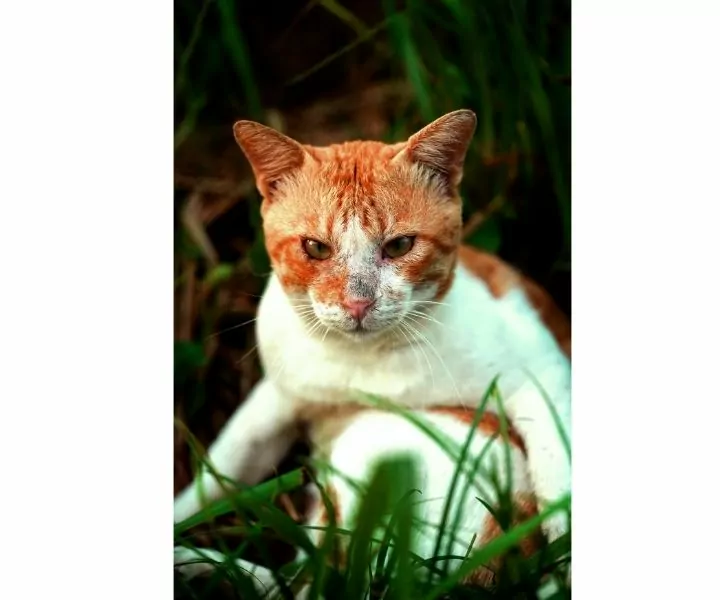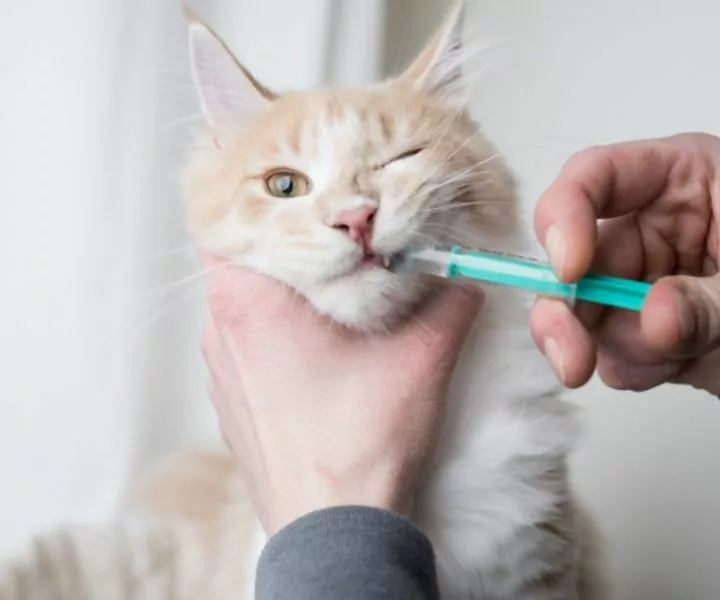What Are Cat Seizures in Older Cats?
Cat seizures in older cats are increased synchronous abnormal electrical activity in the brain’s cerebral cortex, which leads to physical signs such as shaking, twitching, convulsions, and spasms. Older cats can be affected differently by seizures than younger cats which we expand on in this article.

Seeing a seizure in your pet can be a traumatic experience for any cat owner, but having some information to help you understand what is happening can keep you informed and calm, which not only helps you as the owner but also your cat.
Epilepsy is a condition where an animal has repeated episodes of seizures.
Seizures can have many different signs, causes, and treatments, and in this article, we will explain these so that you feel better equipped to deal with seizures should they occur in your cat.
Signs and Symptoms of Cat Seizures
Seizures have four different phases, and there are various signs you might see as an owner depending on when you are around them.
Prodrome
This is the period of time (hours to days) before the seizure begins where you may notice abnormal behavior such as restlessness or anxiety. In some cases, the prodrome may not be noticeable, whereas, in other cats, it may be obvious enough to allow you to predict that a seizure is imminent.
Aura
This term means the period of time just before a seizure. It is also known as the pre-ictal period. As an owner, you may notice your cat is in a pre-ictal phase when you see that they have a sudden behavior change.
You may notice physical signs such as pacing, licking, swallowing, salivation, vomiting, or regurgitation. You may also notice behavioral symptoms such as hiding, attention-seeking, whining, or agitation. The aura usually lasts just a few seconds or minutes prior to a seizure.
Ictal period
is the seizure itself, the signs may include loss of consciousness, altered muscle tone, chewing of the jaw, salivation, and involuntary toileting. Usually, this phase only lasts seconds to minutes.
Postictal period
is what immediately follows the seizure. In this period, the cat’s brain and body are usually exhausted. You may notice signs of disorientation, weakness, blindness, sleepiness, and trouble climbing or jumping. Some cats will also be excessively hungry or thirsty and may have a fever. The postictal phase can last for 24-48 hours.
As an owner, you may not see your cat have a seizure. The only evidence you might discover is signs of toileting in the house or signs of the postictal period.
If you suspect your cat has had a seizure, it is crucial to call your vet and determine if they need to be seen. With modern technology, it is possible nowadays to monitor your pet at home, so this is an option if you are unsure about possible seizures.
Status epilepticus
is a term for an animal that is having a seizure that continues for more than five minutes. If your cat is seizing for longer than five minutes, you need to take them to your veterinarian as an emergency. A long-lasting seizure can cause permanent damage to the brain and needs medical intervention.
The Causes of Feline Seizures in Senior Cats
There are many different possible causes of seizures which are listed below:
- Metabolic diseases such as low blood sugar, liver disease, high blood pressure, hyperthyroidism
- Brain tumors can put pressure on the brain leading to seizures. Tumors are more common in senior cats.
- Bleeding in the brain, such as from a trauma or a tumor.
- Stroke where a blood clot travels to the brain and prevents blood flow.
- Degenerative conditions are more common in older cats.
- Toxins such as antifreeze, insecticides (permethrin), overdosing medications, and tea tree oil applied in high concentrations onto your cat. Toxins can cause seizures in any age cat.
- Idiopathic epilepsy (epilepsy of unknown cause) can cause seizures but is more common in younger cats.
What Should I do if my Cat Has a Seizure
When your cat begins to have a seizure, it can be very stressful and traumatic. Therefore, it is crucial to stay calm and follow the advice of your veterinarian. Below we have listed some do’s and don’ts to help.
DO
- Stay calm, panicking will not help the situation. However, when your cat stops seizing, they may be frightened, and helping to keep quiet will help them know that they are ok.
- Measure the time of the seizure. This is valuable information for your veterinarian. Sometimes time feels like it slows down as you watch your pet have a seizure, so trying to remember how long it lasted afterward may not be accurate. If the seizure lasts more than five minutes, your cat needs to be seen by a veterinarian as it is an emergency.
- Make sure your animal isn’t in immediate danger. If your cat has a seizure in a dangerous spot such as on the road, on the edge of a balcony, or near water, then try to move them but only if it is safe to do so. Seizing animals can injure people, so only attempt to move them if you know you won’t get hurt.
- Reduce stimulation. As an animal comes out of a seizure, its brain will be exhausted. Dim lighting and reduced noise will help to keep your pet calm as they recover.
- Contact your veterinarian. If this is the first seizure you know of, then contact your veterinarian shortly afterward. They may suggest booking an appointment to have them seen. If this is a seizure as part of an ongoing problem, assess the advice already provided, but contact your veterinarian for clarification if you’re not sure.

DON’T
- Attempt to hold or move your pet. Unless your cat is in a dangerous situation, seizing animals should be left alone. Frequently cat’s having a seizure are not conscious and may bite or scratch their owners. Keep yourself and others away from a seizing cat and consider locking away other pets so that they don’t interfere.
- Give other herbs and supplements without discussing this first with your veterinarian. Although they seem natural and safe, herbs and supplements can interfere with medications and should be avoided.
Available Treatment Options For Cat Seizures in Older Cats
The good news is that seizures can be treated better with modern medicine than in the past. The treatment varies on the cause.
Seizures caused by toxins will require treatment through helping to remove the toxin from your cat’s body, potentially through hospitalization and medications. Toxic causes can be suspected by your veterinarian from a thorough history and sometimes through blood and urine testing.
When a cat has seizures from diseases outside of the brain, such as liver disease or hyperthyroidism, these conditions will need to be treated to stop the seizures. These diseases are often diagnosed through blood and urine tests and sometimes imaging such as ultrasound and radiographs.
When toxins and extracranial (outside the brain) causes are eliminated, then your veterinarian will suspect something in the brain. Diagnostic tests such as blood and urine tests will usually be performed before advanced imaging. To see inside the skull, CT or MRI is required.
This is usually only available at referral hospitals. When a cause in the brain is suspected or confirmed, then specific treatment can be started. For example, if a brain tumor is found, then radiation therapy might be considered.
Where an exact cause isn’t found or if seizures can’t be managed, there is medication to help prevent seizures. Two examples include phenobarbital and imepitoin. These medications are long-term treatments and should not be stopped without a veterinarian’s advice.
Where a cat is actively seizing medications to help stop it, include diazepam and propofol. Diazepam can be prescribed for owners to give during a seizure so if this is something you’re interested in, chat to your vet.
A List of Information to Provide to Your Veterinarian
Here is a list of information that will be valuable to your veterinarian:
- At what age did the seizures start?
- How often does your cat have seizures? (It can be helpful to keep a record of the date of occurrence and length of the seizure.
- Are the seizures getting worse? (i.e., more frequent or lasting longer?)
- Does your cat have access to any toxins such as insecticides or antifreeze?
- Does your cat have any other health problems, such as hyperthyroidism?
- Is your cat on any medication?
- How long did the latest seizure last?
- How is your cat’s health otherwise?
- What do you feed your cat, and do you give any herbs or supplements?
- Can you administer medications?
Important Considerations When Prescribing Anticonvulsant Medication for Senior Cats
Anticonvulsant medications can help prevent seizures, but there are some important considerations when your pet is prescribed them:
- Always follow the instructions on the label and give the medication as prescribed.
- Ensure you have a good understanding of possible side effects and what to do if you notice any.
- Never run out of medication. Anticonvulsant medication should not be stopped unless recommended by your veterinarian. Make sure that you have plenty and contact your veterinarian at least a few days before you run out so that there’s plenty of time to get more.
- Keep the medication safe away from children or pets.
- Do not administer any other supplements or herbs while your pet is taking anticonvulsant medication unless your veterinarian said it’s ok.
- Do not stop giving the medication unless your veterinarian recommends it.

The Side Effects of Anticonvulsant Medication
Unfortunately, anticonvulsant medications can have side effects. The good news is most cats will just have mild side effects such as sedation or lethargy. Most of these side effects are temporary and disappear as your animals develop a tolerance to the medicine.
If you notice any severe side effects such as inappetence, contact your veterinarian.
It is vital that you do not change the dose or timing of anticonvulsant medication without first discussing it with your veterinarian.
Can my Cat Still Have Seizures When it’s on Medication?
Medication can help prevent seizures but may not stop them entirely.
There are many possible reasons for this, but one simple answer could be that the medication isn’t in a high enough dose to stop seizures. When animals are prescribed anticonvulsant medicines, they are often started on a relatively low dose and titrated.
This is to prevent side effects and toxicity and to find the “lowest effective dose”.”Once your pet has begun a new medication, they will likely need to come back and have repeated checks and blood tests while the correct dose is found.
Other possible causes include the problem worsening and requiring more medication as it progresses, other health concerns causing seizures that haven’t been addressed, or the medication not being the correct treatment for seizures in your cat.
Summary
Seizures can be a stressful time for any pet owner. Although seizures aren’t caused by one specific condition, they are instead a symptom of something that needs to be addressed.
Many signs can occur before, during, and after seizures, which can be monitored.
Going and having a consultation is an essential first step after seeing your cat have a seizure so that answers can be found.
If you notice your cat having a seizure lasting more than five minutes, then this is an emergency, and you should take your cat to your veterinarian right away.
With modern medicine, the cause of seizures can be more easily found and treated, although in some cases, a cause may never be found.
Where seizures are infrequent and last short periods of time, no treatment may be required.
If you think your cat is having seizures, contact your veterinarian for advice.
